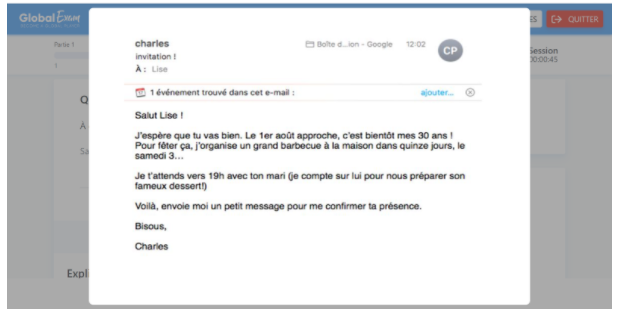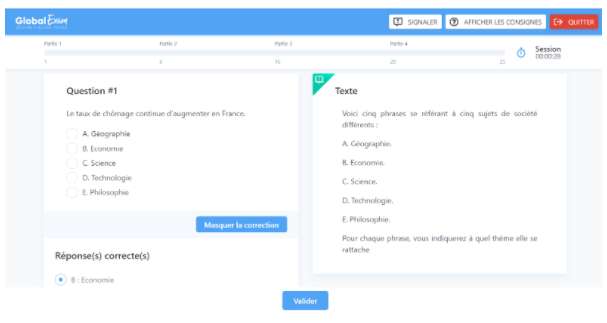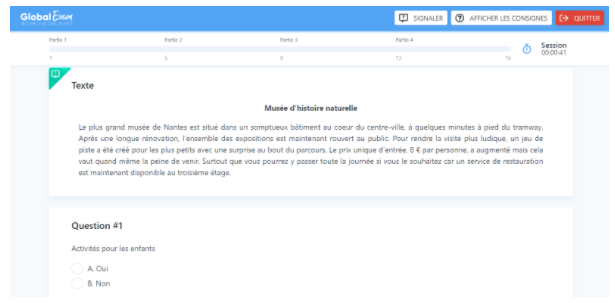To follow up on our series of articles on the DELF exam, here we focus on its reading section and inform you on the key elements you need to know to pass it with tips and examples. Especially, this blog aims at:
- Reminding you the concept of the DELF and explaining the structure of the reading section
- Showing you some representative examples with the associated correction
- Giving you tips to prepare and succeed
- Explaining how to practice with us!
If you wish to take the test, to practice DELF with GlobalExam is the best solution for you!
Let’s start reading to your success!

What is the DELF reading section?
The structure of the DELF exam is divided into four distinct modules, three of them are sat exams taking place back to back. They include:
- A listening examination
- A reading assignment
- A written skill assessment
- A speaking examination
The reading section aims to assess your reading comprehension by showing you numerous short documents followed by simple comprehension questions such as ticking, MCQ and true/false, or a written answer.
The structure of its tasks is summarised in the following table:
| What is the DELF reading section? | Assignment | Length (min) |
|---|---|---|
| A1 | Very short texts (4-5) to read and comprehension questionnaires on everyday life | 30 |
| A2 | Short texts (3-4) to read and comprehension questionnaires on everyday life | 30 |
| B1 | 2 longer texts to read and comprehension questionnaires wherein you extract key information and analyse the contents of the document | 35 |
| B2 | 2 longer documents of 1000 words max (usually one regarding France and one of an argumentative nature) to read and comprehension questionnaires for which you extract information and analyse the contents of the document | 60 |
Reminder of the DELF exam
DEFL stands for Diplôme d’Etudes en Langue Française. This exam is an official qualification awarded by the French Ministry of Education to assess and certify that, as a non-French native speaker, you have reached a particular level of fluency in French language.
The DELF is opened to everyone. Indeed, the difficulty exam is specifically designed to adapt to primary school students, secondary school students or adults (common or business level). In terms of contents, it is made of four independent certificates that regroup the first four levels of the Common European Framework of Reference for Languages (from level A1 to level B2).
174 countries worldwide acknowledge one’s French level according to the results obtained from this exam such that it represents 400 000 new registrations per year in 1186 certified centres.
Hence, the DELF is the appropriate exam to pass if you want to apply to French jobs or start a new university degree.
DELF reading section: Exercises and answers
The difficulty of the tasks is proportional to the chosen level. Since you have to obtain a homogeneous marking between all four assessments (if not it is a fail) and that a suitable global scoring should be around 50 and 100 points, you must carefully select the level to pass such that it fully matches your written skills.
If you are unsure of your real French level and hesitate between two, go for the lowest level to avoid failure and secure a pass.
Below are some representative exercises and the associated answers for each level.
Level A1 – Targets candidates who just comprehend French and can formulate simple sentences
Exercise: Read the text and answer a few questions
“Hi Lise! Hope you are fine. The 1st of August is approaching and I am going to turn 30! To celebrate, I am organising a BBQ at home in 15 days on Saturday the 3rd… I count on you and your husband (…) Text me back to confirm you will join us. Cheers, Charles”
Question 1: To whom is Charles writing? No MCQ here, Answer 1 is Lise.
Question 2: What is the occasion? Here it is an MCQ: A. A restaurant; B. A birthday or C. Summer. Answer 2 is B.

Level A2 – Targets candidates who understand simple sentences and can describe simple things
Exercise: You have 5 statements associated with societal problems:
A. Geography; B. Economy; C. Sciences; D. Technology; E. Philosophy
For each of the following sentences, you need to indicate to which theme it belongs.
Statement 1: The unemployment level keeps rising in France. Answer 1 is B. Economy (as shown in the example below)
Statement 2: Los Angeles has a Mediterranean climate. Answer 2 is A. Geography

Level B1 – Targets applicants who can discuss about broad subjects and express an opinion
Exercise: You are spending a day with your two nieces at Nantes and are looking for visiting a museum that offers activities for children, reduced prices for unemployed persons, foods and drinks and has easy access to public transports.
Text: “Museum of natural history. The Largest museum in Nantes is located in a beautiful building in the heart of the city, a few min by walk from the tram. After a long renovation, all rooms are now opened to the public. To render the visits more interesting to children, a treasure hunt game is offered (….). “
Question 1: Activity for children A. Yes; B. NO. Answer 1 is A.
Question 2: Reduced price prices for unemployed persons? A. Yes; B. NO. Answer 2 is B.

Level B2 – Targets applicants well articulate in French, who comprehend speeches and can deliver an opinion.
Exercise: You read a paper on gender equality. Thick the correct answer.
“Although we observed significant progress in gender equality, more needs to be done. Cliché are strong and mentalities are hard to change. Marie, the president of an association to combat the right to gender equality explains: according to the last observations, in 2019 (…) 73% of men are engineers against only 27% of women. (…). The government has thus announced 40 new measures (…).
Question 1: What is the conclusion of the gender equality drawn in this article? A. Very Positive; B. Very negative; C. Both. Answer 1 is C.
Question 2: Professionally, women… A. Earn as much as men; B. Earn more than men; C. Earn less than men. Answer 2 is C.
Key tips for the DELF reading section
To pass the reading DELF exam, we advise you to read as many documents, articles, and books in French as you can, which will help you learn as much vocabulary as possible. The day of the exam, carefully read the questions first and take notes. Obviously stay focused and do not skip over practicing.
Take a step further and practice with GlobalExam
Dedicated to providing the finest training practices to certified languages exams through an e-training platform, we, at GlobalExam, give you access to numerous exercises, practical and mock exams to get you ready to pass any exams including the DELF. Regardless of your level, you will be able to practice in real conditions, follow your scores, monitor your progress and improve your statistics thanks to a resourceful working program.
Let’s work together to make you a successful candidate and join us on GlobalExam now!



